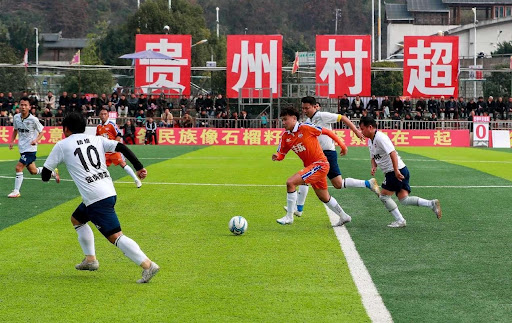By Fan Jiayuan, Sun Longfei, People’s Daily
With flags flying high, the melodious sound of the reed pipes, the resounding beats of drums and gongs, cheerleaders dancing and singing, and a packed stadium, the 2024 season of the Village Super League, or “Cun Chao” in Chinese, kicked off on Jan. 6, 2024 in Rongjiang county, Qiandongnan Miao and Dong autonomous prefecture of southwest China’s Guizhou province.
“The new season sees a significant increase in the number of participating football teams. Last year, the Village Super League featured 20 teams, while this year, over 1,800 players from 62 football teams will partake in the new season,” said Lai Hongjing, a member of the organizing committee of Village Super League and a P.E. teacher of No.1 Middle School of Rongjiang county.
“Cun Chao” is a grassroots football league that has gained popularity in China in recent years. Chinese internet users dub it the “Village Super League”, drawing inspiration from renowned leagues such as the English Premier League and the Chinese Super League.
By hosting the Village Super League matches, Rongjiang, with a population of less than 400,000, became a sensation last year, attracting attention and generating revenue.
According to the Village Super League Office of Rongjiang county, from May 13 to Dec. 31, 2023, “Cun Chao” received more than 58 billion page views online, and the livestreams of the matches attracted more than 600 million views online.
During the same period, Rongjiang received 7.33 million tourist arrivals, translating to tourism income of 8.113 billion yuan (about $113 million).
The success of “Cun Chao” is attributed to the fervent football community in the local area.
In the 1990s, residents of Rongjiang county started to organize matches on open fields. Presently, the county boasts 25 football fields, 35 registered teams, and 41 schools offering football coaching. Nearly 50,000 people in the county play football.
“Cun Chao” is not the only sports event that has been deeply involved in the grassroots and has achieved great success.
In Taipan village, located in Taijiang county, Qiandongnan Miao and Dong autonomous prefecture, the local community upholds the tradition of playing basketball during festivals. Through the establishment of the “Cun BA”, or Village Basketball Competition, Taijiang county received over 2 million tourist arrivals in a year, resulting in tourism revenue exceeding 2.3 billion yuan.
In Wenchang, a county-level city in south China’s Hainan province, every village has its own volleyball court and everyone plays volleyball. The popularity of the village volleyball league has now extended from offline to online platforms.
Village sports events, originating from rural areas, play a significant role in the development of these regions. By actively involving the local community and capturing people’s attention, these events have unlocked a multitude of values.
Various rural sports events have also stimulated economic development.
During the breaks between the matches, the audiences were treated to captivating cultural performances. Outside the sports venues, e-commerce live-streaming sessions were hosted, offering a platform to sell a wide range of cultural and creative products.
Sports events have played a role in empowering the tourism and cultural industries, paving a new path towards rural revitalization. They have brought attention to Guizhou’s distinctive cuisine, agricultural products, and intangible cultural heritage.
They have also led to the creation of tourism projects and increased employment opportunities for the local community. The online buzz generated by these events has translated into increased offline foot traffic, ultimately benefiting the residents of Guizhou.
The thriving rural sports events allow more people to appreciate the charm of sports and experience the excitement of competition.
To demonstrate their support, villagers raised funds for their teams, stitched team emblems, and offered their seats to accommodate tourists. They even formed a volunteer team of drivers to contribute their share to the games.
Yang Bing, a commentator for the “Cun Chao”, said sports serve as a bond that unites people, instilling a sense of confidence in the local culture of Rongjiang.
Mass sports, deeply ingrained in rural areas, continue to exude vitality, infusing a fresh atmosphere into the hosting regions.
During the Village Super League matches, young entrepreneurs who have returned to their hometowns after graduating from college hosted live-streaming sessions, promoting local agricultural products. The impact of “Cun BA” is evident, as many neighboring villages have reaped the benefits of these basketball games.
“Over the past decade, driving rural revitalization through sports has emerged as a prominent aspect of China’s sports industry development, yielding many success stories. The innovative approaches implemented in Rongjiang county and Taijiang county serve as valuable references for integrating culture, sports, and tourism to stimulate economic and social development, thereby fulfilling the aspirations of the people for a better life,” said Wang Xueli, director of Tsinghua University Sports Industry Development Research Center.







